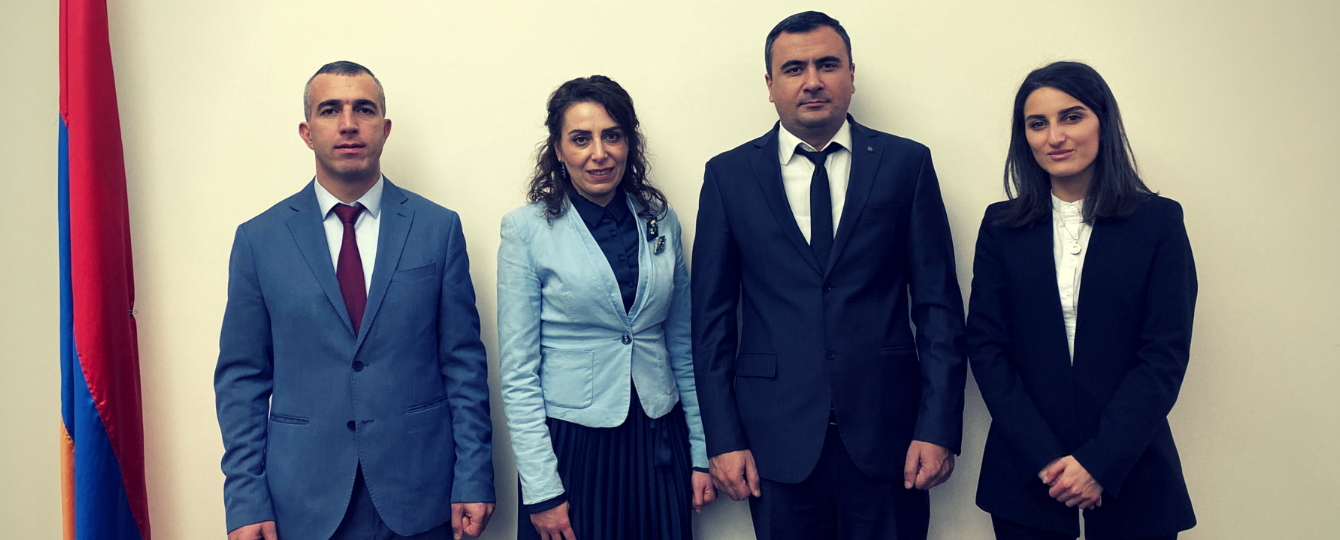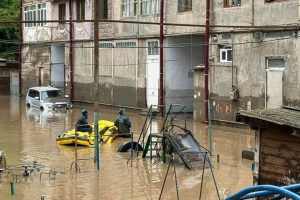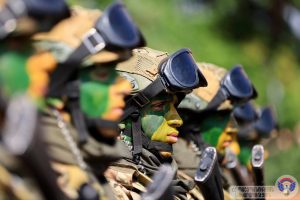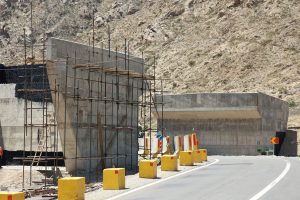The activity of the newly established Commission on Prevention of Corruption in Armenia is in its infancy. This self-governing body will generally study the property declarations of officials, prosecute the cases of conflict of interest, initiate proceedings, and, in case of corpus delicti, it will forward cases to the Prosecutor General’s Office. In addition to the above, the body will also implement anti-corruption education programs and several other functions.
The five members of this newly formed body were elected by the Parliament on November 19 by a secret ballot. Based on the amendments made to the RA Law on the Commission on Prevention of Corruption, the candidates were nominated by RA Government, the Supreme Judicial Council, the ruling faction and two opposition factions.
On November 26, the first session of the Commission was held, during which the head of the Commission was elected. One of the two candidates was Edgar Shatiryan from the “My Step” alliance of the parliamentary majority, and the other candidate was lawyer Haykuhi Harutyunyan, nominated by the opposition “Bright Armenia” faction. The latter was elected as the Chairwoman.
Shortly after the election of the head of the commission, Shatiryan withdrew, which means that “My Step” alliance will nominate a new candidate for the post.
Haykuhi Harutyunyan, the newly elected Head of the Commission, has been a human rights activist since 2003, having worked for many years at the Helsinki Citizens’ Assembly-Vanadzor office, and later was Head of the Protection of Rights without Borders NGO.
Along with her activity in the field of human rights, she managed to get her Master’s Degree at the University of Minnesota School of Law, USA, in 2012, specializing in leadership, human rights and the rule of law.
The other members of the Commission are Lilit Aleksanyan nominated by the Government, Aramayis Pashinyan nominated by the Supreme Judicial Council and Narek Hambardzumyan nominated by the Prosperous Armenia Party.
The posts of the members of the Commission shall be deemed civil. According to the Law on “Remuneration for Public Officials” and “State Budget for 2019”, members of the Commission will receive about 794,000 drams (about $ 1700) including taxes, and the head of Commission will receive about 926,000 drams (about $ 1900) including taxes.

Members of the Commission on Prevention of Corruption in Armenia
The Importance of the Commission’s Activity
During the exclusive interview, Haykuhi Harutyunyan, Head of the Commission on Prevention of Corruption, told “Ampop Media” that the law provides sufficient leverage to launch the activity but after some practical activities, they plan to apply to the legislative and executive bodies with a proposal to eliminate the shortcomings.
“We are now in a difficult stage – the analysis of information and the results applied to it. If we discover that someone has received a precious gift that is incompatible with his or her activity, or if there is any doubt that someone has provided another type of service, or obtained any privilege for a group or individuals, we will be working in a completely new scheme,” Harutyunyan said.
According to her, this is precisely the format that such bodies did not apply previously. Harutyunyan says that now the commission will play a very important role as filter to reveal the above-mentioned cases. In addition, it also has a direct responsibility to forward these cases to the Prosecutor General’s Office and to follow up that it assesses them properly.
At the same time, Haykuhi Harutyunyan stresses that the institution she runs has no punitive function and does not possess the instrument of bringing prosecution within the framework of criminal proceedings; it performs the function of gathering data and facts.
In fact, the Commission headed by Harutyunyan will replace the Commission on Ethics of High-Ranking Officials established in 2012, expanding the scope of activities. The full staff of the Commission on Prevention of Corruption currently consists of 10 employees, three of whom are administrative staff.
“The staff mainly includes the members of the Commission on Ethics of High-Ranking Officials. Unfortunately, this is not enough in terms of professional skills and quantity,” Harutyunyan says.
It is planned that there will be 35 positions in the Commission which will be employed next year.
The new body has already received applications, letters about conflict of interest and other. They are also working on a new declaration format that will come into force on January 1.
Haykuhi Harutyunyan notes that the Commission shall not make any distinction between judges, prosecutors or any other official; declarations will be checked in the same way. In the case of judges, Harutyunyan points out that there is a relevant body, the Supreme Judicial Council (SJC). In the case of violations identified by the Commission, they will be transferred to SJC and serve as a basis for the body to institute proceedings.
The Independence of the Commission
One of the most discussed issues since the establishment of the Commission is related to independence. Can the nomination by the executive, legislative and judicial bodies prevent the commissioners from acting independently and freely?
Haykuhi Harutyunyan thinks that this issue is exaggerated. “I know that I have been nominated by a specific political force but with the condition and it is legally binding that it has no leverage to influence my further activity. How should I be restrained? I have clearly adopted an approach that my aim is not to protect the interests of the group that nominated me but to prevent corruption. So why should I compromise with that force?”
As a reply to the remark that personal relationships may play a role, the head of the Commission notes that this is already a feature of personal endurance.
“No matter what political force will nominate, if I don’t have the endurance and tend to make a decision under some influence, I can likewise be influenced by public opinion, which sometimes becomes overwhelming,” Harutyunyan says.
Increasing transparency and accountability will only promote the independence of the commission, Harutyunyan believes.
“Let’s bring that to the agenda. We really need more accountability, more transparency. Accountability provisions in the law adopted in 2017 pursued a completely different purpose,” Harutyunyan says, adding that the Commission is interested in increasing accountability.
“If I raise the issue of more accountability and transparency, I will insure myself against all possible influence levers. The more we are accountable, the more independent we will be. However, we have very little accountability requirement under current law.”
Political Will to Fight Corruption
Varuzhan Hoktanyan, Project Director at Transparency International Anti-Corruption Center, told “Ampop Media” that there were risks in the formation of the Commission by nominating members by the legislative and executive bodies but there are similar risks in case of selecting them via competition.
“Independence must come from within, and that is when you are not afraid to do something that those on the top do not want. Corruption was profit for former rulers besides being pleasure. I hope it won’t happen to the new ones,” says Hoktanyan.
Over the past 18 years, 4 strategic documents have been developed in Armenia (2003-2007, 2009-2012, 2015-2018 and 2019-2022).
Prior to the establishment of the Commission on Prevention of Corruption, there have been anti-corruption councils in the history of Armenia’s anti-corruption activities, as well as the Commission on Ethics of High-Ranking Officials.
The first Anti-Corruption Council was created in 2004 by the order of RA second President Robert Kocharyan. The same body was created in 2015. Such a body was also established by the current authorities, called the Anti-Corruption Policy Council. As Hoktanyan points out, the similarity of the three councils was that these bodies only gave advice, and their implementation did not take place. According to a representative of Transparency International, this is a
serious test for the new government to check whether what is written in the documents will be brought to life.
Talking about this issue, Haykuhi Harutyunyan emphasizes the existence of the political will.
“No matter how much we want to avoid political assessments, the first precondition is the political will that has been manifested,” Harutyunyan thinks.
According to her, without the political will the work of the commission would be difficult. “I am not saying that it will not work but it will remain on a personal level. It will require a greater degree of endurance to move consistently to the end of every issue.”
Haykuhi Harutyunyan, however, emphasizes that at this moment such personal qualities will be required as there will always be resistance in the middle ranks. “At least at this point, the government has made the fight against corruption very strict, and the Commission is one of the most effective mechanisms for doing it.”
The Commission is currently working temporarily in the National Security Council building. According to Harutyunyan, another territory was planned for the Commission yet in 2018. However, that territory is on the ground floor with sanitation and lighting problems, that is why it is not possible to organize effective work there.
Article by Karine Kirakosyan
Responsible Editor Suren Deheryan
The article makes part of “Economy and Society in the Regions of RA” article series
For Armenian original CLICK HERE
© The copyright of stories and visualizations on Ampop.am belongs to “Journalists for the Future” NGO. It is forbidden to use Ampop’s content and images without active hyperlinks to the source website. Uploading of infographics and images of Ampop.am is possible only in case of an agreement reached with JFF.
Փորձագետի կարծիք
First Published: 24/12/2019









